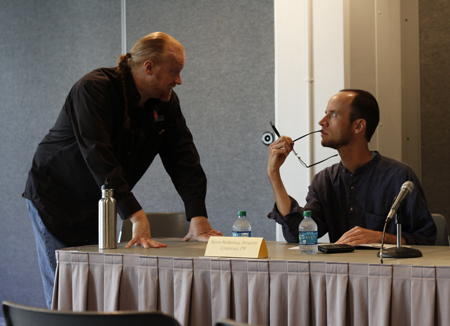
Story by Mitchell Brown, for The Muleskinner — (WARRENSBURG, Mo.) It’s not every day that filmmakers from as far away as New York City, South Africa and France converge on the campus of UCM to showcase films with a social justice theme. But the Show Me Justice Social Justice Film Festival does that once a year.
This was the third year of the film fest, which took place Oct.17-20. During the event, a total of 800 seats were filled.
One of the aims of the festival was to inspire individuals and communities toward action against social injustice. Ronald Portis, assistant at the festival and freshman broadcast media major, said social justice is about “standing up for people who can’t stand up for themselves.”
A total of 53 films were shown. In the afternoon, collections of short films were shown, and feature-length films were shown in the evening. Two round table discussions with filmmakers were conducted on Friday and Saturday.
The first feature film shown was “Lost Angels,” a documentary about the lives of homeless people in the Skid Row section of Los Angeles. The film highlighted links between homelessness, drug addiction and mental illness.
The next film was “Living Room,” a short film about homeless families in Ohio.
“I wanted to focus on those who had been pushed to the fringes,” said director Nikki Heyman. “We’re quick to judge, and we have stereotypes and schemas. The beauty of a documentary is that you can show the other side and crack schemas and rearrange what the picture looks like.”
Following “Lost Angels” was “Love Orchard,” a narrative film about immigration. The movie’s director, Farhad Mann, took questions from the audience afterward.
“The After Party,” directed by Michael Schiller, is centered on post-9/11 domestic surveillance. The film was initially supposed to be about youth political involvement.
Schiller followed and filmed Andre Benjamin, also known as Andre 3000 of the rap group Outkast, across the country focusing on voter registration and creating more political awareness. The theme of Schiller’s film was altered after he was caught up in a mass arrest while filming a protest at Ground Zero during the 2004 Republican National Convention in New York City.
The NYPD arrested 1,800 people in one swoop. Schiller was arrested, but he wasn’t one of the protestors.
“I spent two days in jail for the crime of walking down the street in New York City filming a protest,” Schiller said.
In response, Schiller filed a lawsuit against the city of New York, and the judge presiding over the case ruled in his favor, finding the mass arrests to be unlawful.
Schiller’s case also exposed an NYPD spying operation on law-abiding organizations and individuals without warrants. A number of those arrested in the mass sweep were acquitted because of Schiller’s footage, which captured instances of police brutality.
“Even if the judge hadn’t ruled in our favor, we would have still had a level of justice and redemption by exposing the truth of what happened,” Schiller said. “My ability to change things is little to none. What I can do is observe.”
“The After Party” can be seen in full online at www.snagfilms.com/theafterparty.
The film “Difficult Love,” directed by Peter Goldsmith, was also shown Oct. 19, following Schiller’s film. The film focused on the lives of black lesbians in South Africa and the discrimination and exclusion they often face. Zanele Muholi, a lesbian photographer and artist, was the focal point of the documentary.
The movie also captured stories of brutalization of lesbians, explaining that the assailants were attempting to “turn them straight.”
“Dealing with things that are negative is not to be negative,” Goldsmith said. “We as human beings are moved by stories of people overcoming the odds.”
“Difficult Love” was an example of the international theme running throughout the festival.
The subjects of the films ranged from national, to international, to regional. The last category was exemplified by “Corporate FM,” directed by filmmaker Kevin McKinney of Kansas City, Mo.
The thesis of his film is that the Telecommunication Act of 1996 paved the way for coast to coast corporate consolidation, in which conglomerates like Clear Channel could then buy up multiple radio stations in one area, thus changing the DNA of radio.
The film shows the effects of when ownership is moved from local hands to corporate hands, which is explained in a segment of the movie called “the indie ghetto.”
It explored how local independent artists are often ignored or relegated to fringe airplay, instead of regular rotation by radio stations within in their own cities. This is due to not fitting with a corporate prescribed and predetermined playlist.
McKinney said he has yet to encounter anyone who has spoke favorably about the Telecommunications Act of 1996.
He said the state of radio could improve if the act were nullified and ownership of stations was local once again. “Corporate FM” won the “Audience Favorite Award” at the festival.
More information on “Corporate FM” can be found at www.fmfilm.com.
The final film of the festival was “One Day After Peace,” which focused on the violence of the Israeli/Palestinian conflict and the possibility of bringing a resolution to the conflict by adopting some of the same methods of resolution used in post-Apartheid-era South Africa.
Mark von Schlemmer, associate professor of communication and festival director, said the movie was an example of a documentary capturing genuine emotion. He also said that “One Day After Peace” encapsulates what social justice is all about.
Categories:
Show Me Justice Film Festival inspires change
Written by Muleskinner Staff
October 25, 2012
0






